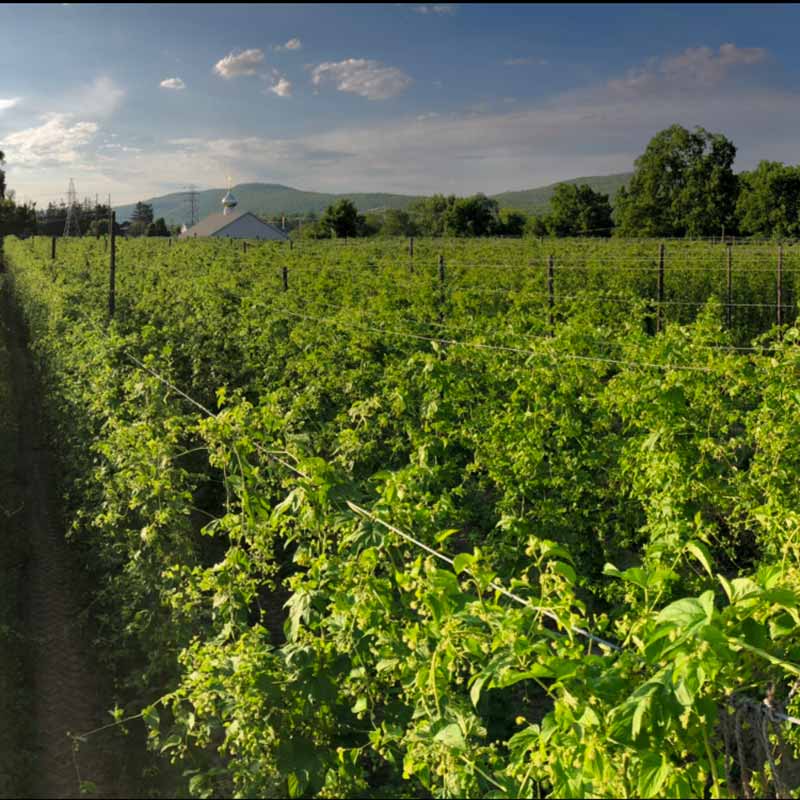
Hops are one of the most crucial ingredients in beer, so brewers need to stay on top of how they’re performing. Recently, the USDA released its National Hop Report, and the Hop Growers of America released their 2023 Statistical Report, detailing everything from hop acreage by state to variety to the top ten Pacific Northwest (PNW) hop varieties to hop acreage by aroma/dual-purpose versus alpha hops. We dug into the data to show how hops performed in the U.S. in 2023.
Wondering how hops are fairing elsewhere in the world? According to its 2023 harvest season, Australia showed signs of growth. Check out the full report here.
(Above photography courtesy of The HOPGUILD)
Affordable, Industry-Leading Brewery Software
Hop Production in the U.S. in 2023 Compared to the Rest of the World

Graph courtesy of USDA-NASS and HGA Hop Acreage Reports
Early in 2023, we wrote about the surplus of hops in the United States, with experts speculating that, at some point, hop growers would have to dial back on production because of the influx of inventory they already have in warehouses. Experts said buying into a contract might be in your best interest.
How did this play out last year?
According to the USDA National Hop Report, which cites production in Idaho, Washington, and Oregon, hops harvested rose two percent from last year to 104 million pounds, up from 102 million pounds a year ago. However, the acreage of hops across the three states actually fell ten percent from a year ago to 54,318 acres.
Pounds per acre, on the other hand, rose 221 pounds from a year ago, with an average of 1,915 pounds per acre.
The production led to $562 million in sales, down nine percent from 2022.
From a global view, no country does it better than the U.S. when it comes to aroma or dual-purpose hops. The U.S. accounts for just about half of the world’s production at 41,170 acres—actually down nearly nineteen percent from a year ago.
Germany is the closest to the U.S. in aroma/dual-purpose hops with 25,299 acres, also down about three percent from 2022.
Australia produced 1,965 acres of aroma hops and was the only country worldwide with significant growth at just over seventeen percent. The global aroma acreage is down about nine and a half percent from 2022.
The U.S. produced a little over 14,000 acres of alpha hops in 2023, up nearly thirty-seven percent from a year ago, but still nearly 10,000 acres behind Germany, which produces the most alpha acres worldwide at 24,056, which is a slight uptick of nearly two percent from a year ago.
China is the third largest producer of alpha hops at 5,291, equal to what the country produced a year ago.
“Growers shifted to idling yards and replacing aroma and dual-purpose varieties with super high-alpha cultivars,” HGA says in its report. “The season served as the first period in twelve years with a substantial decrease in acreage. … Despite the acreage reduction, yields climbed thirteen percent above the ten-year average.”
Combined, the U.S. produced 55,710 acres of hops, a thirty-eight percent share, tops worldwide, just ahead of Germany with 49,355, which is a thirty-four percent share.
The U.S. and Germany combine for 105,045 acres of hops, or seventy-two percent of the world’s hop production. The rest of the world combined produced 40,677 acres. In terms of poundage of hops produced, the U.S. (104,942,501 pounds) and Germany (90,904,476 pounds) are the top two shareholders worldwide at forty percent and thirty-five percent, respectively.
What Were the Most Harvested Hops in America in 2023?

Hops from Beach Hill Hops | Photography courtesy of The HOPGUILD
No shocker here. It’s a Citra world, and all the other hops are just living in it.
According to the 2023 Statistical Report from the Hop Growers of America, Citra was the top hop harvested in the U.S. for the sixth straight year, dating back to 2018, albeit a lighter harvest than years past, with growers only harvesting a total of 8,856 acres in 2023, down from 12,044 the year prior.
The second most-harvested crop in 2023, CTZ jumped from fourth in 2022, with 4,518 acres, to 6,354 acres this past harvest season. CTZ reclaimed the spot from Mosaic for the first time since 2020. Mosaic dropped to third with 5,276 acres, down from last year, when growers harvested 6,501 acres.
Cascade dropped to number four with 4,484 acres harvested, down from its number three spot a year ago, when farmers collected 5,107 acres. Simcoe and Centennial retained their No. 5 and No. 6 spots, respectively.
The top ten harvested hop crops totaled just over 39,000 acres, down for the second consecutive year and below 40,000 acres for the first time since 2018.
“In response to a long inventory of aroma hops, in 2023 acreage of these varieties decreased eighteen and a half percent, exhibiting a sizeable correction to address the oversupply,” HGA says in its report. “While achieving a market balance may not be realized in one year, the cut signifies an important step towards resolution.”
The State With the Highest Production of Hops

Graph courtesy of USDA-NASS, prepared by HGA
The Pacific Northwest states of Idaho, Oregon, and Washington dominated the harvest in 2023. Washington, with 38,851 acres harvested (down about nine percent from 42,762 acres in 2022), led head and shoulders above all the other states. In fact, the Evergreen State harvested more hops than all other forty-nine states combined, roughly 17,000 acres of hops.
The top five hops harvested in Washington included Citra, Columbus, Simcoe, Mosaic, and HBC 682, respectively. The experimental HBC 682 hop rose thirty percent year over year, with 2,226 acres harvested in 2023 from 1,709 in 2022.
Overall, the Pacific Northwest accounted for 54,318 acres harvested—the U.S. as a whole harvested 55,710 acres—with Oregon and Idaho harvesting 6,822 and 8,645 acres, respectively.
Michigan topped all the non-Pacific Northwest states with 380 acres harvested, followed by New York with 300 acres harvested. The only other state nationwide with over 100 acres harvested was Montana, with 197 acres.



